Struggling to keep up with your health goals?
AI powered health monitoring is changing the game by offering real-time insights and personalized advice.
In 2025, wearables and AI apps will take your wellness journey to the next level. Discover how to make the most of this tech today.
Key Takeaways:
- AI-Powered Health Monitoring:AI analyzes data from wearables and health apps to provide real-time insights and personalized health recommendations. Devices like the Apple Watch and WHOOP use AI to monitor heart rate, sleep, and recovery.
- Personalized Wellness: AI customizes health recommendations based on individual data, helping users improve their fitness, manage stress, and track nutrition. AI can predict and manage chronic conditions like diabetes and heart disease.
- Future of AI in Healthcare: In 2025, AI will integrate with telemedicine, genetic testing, and biotechnology to offer more accurate health insights, proactive care, and real-time health consultations, improving overall wellness management.
What is AI-Powered Health Monitoring?
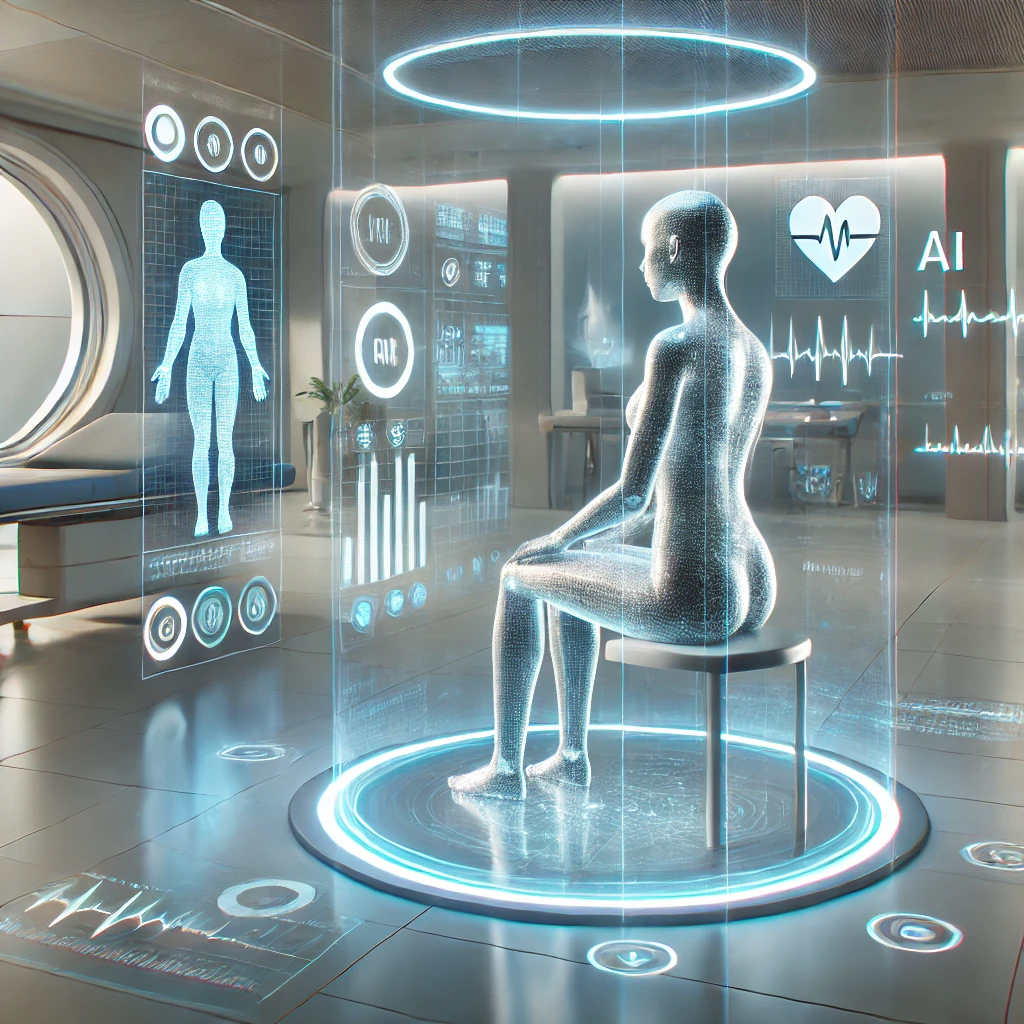 AI powered health monitoring uses artificial intelligence to track, analyze, and interpret health data, providing real-time insights and personalized health recommendations.
AI powered health monitoring uses artificial intelligence to track, analyze, and interpret health data, providing real-time insights and personalized health recommendations.
The technology works by integrating wearable devices and apps to monitor your health continuously. This means better, smarter decisions for your well-being, without having to rely on traditional healthcare methods.
How It Works
Wearable Devices Collect Health Data:
Devices like smartwatches and fitness trackers gather important health data. This includes heart rate, sleep patterns, physical activity, and more.
- Example: The Apple Watch tracks your heart rate, steps, and even detects irregular heart rhythms.
AI Analyzes the Data:
Once the data is collected, AI algorithms analyze it. They look for patterns and trends, offering recommendations based on your individual needs.
- Example: If your heart rate spikes during a workout, AI may suggest a slower pace or more rest time.
Personalized Recommendations:
Based on your data, AI provides recommendations to help you achieve your fitness goals. This could be adjusting your exercise routine, optimizing your sleep, or improving your diet.
- Example: An AI-powered app might suggest specific sleep tips based on your tracked sleep data, helping you rest better.
Real-World Examples of AI-Powered Health Monitoring Devices
Apple Watch:
Tracks your activity, heart rate, and sleep, offering real-time health alerts and suggestions. It can even detect irregular heart rhythms, potentially saving lives.
Learn more about Apple Watch AI features
Fitbit:
Provides in-depth analysis of daily activity, heart rate, sleep, and stress levels. It offers insights to help you improve overall health.
Explore Fitbit’s health monitoring
WHOOP:
Focuses on recovery by tracking your sleep quality, strain, and overall readiness, helping you make smarter decisions about your workouts.
Discover WHOOP for fitness tracking
Oura Ring:
A sleek wearable that tracks your sleep, activity, and overall health, providing personalized insights to improve both physical and mental well-being.
Check out Oura Ring’s health features
The Role of AI in Personalized Wellness
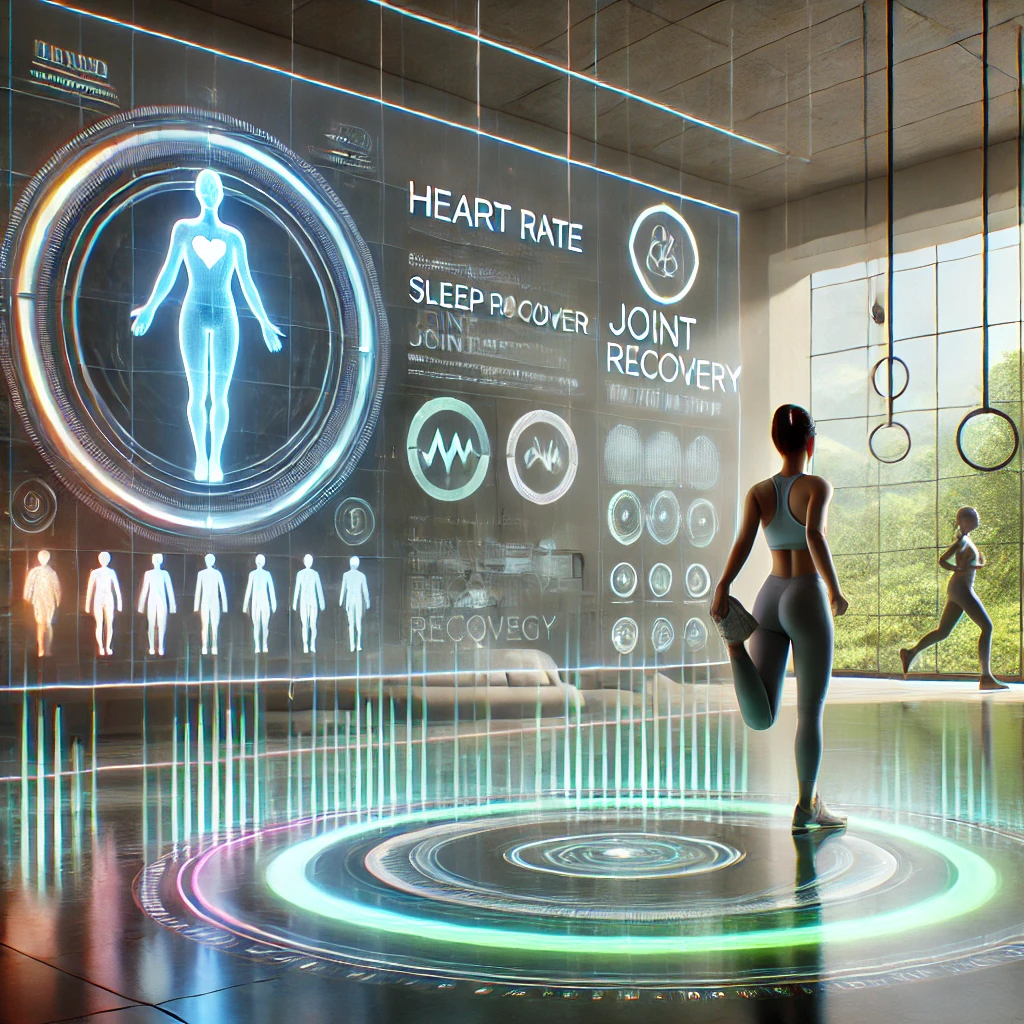 Personalized wellness is about creating health strategies tailored specifically to you—your body, your habits, and your goals. Instead of following generic advice, personalized wellness focuses on understanding your unique data, preferences, and needs to develop health solutions that work best for you. This approach leads to more effective results because it’s built around you.
Personalized wellness is about creating health strategies tailored specifically to you—your body, your habits, and your goals. Instead of following generic advice, personalized wellness focuses on understanding your unique data, preferences, and needs to develop health solutions that work best for you. This approach leads to more effective results because it’s built around you.
- Example: If you’re a runner, a personalized wellness plan might focus more on joint recovery and stamina training than on muscle building.
How AI Helps Personalize Wellness
AI technology plays a crucial role in taking personalized wellness to the next level. Here’s how:
Customized Diet Plans:
AI apps like MyFitnessPal use data such as your activity level, fitness goals, and health history to suggest personalized meal plans. This helps ensure you get the right balance of nutrients to meet your unique needs.
- Example: If your goal is fat loss, AI can suggest lower-calorie, higher-protein meals, adjusting over time as your progress is tracked.
Personalized Fitness Recommendations:
AI-powered devices like the Fitbit and WHOOP track your activity levels, sleep patterns, and recovery. Based on this data, they recommend custom workout routines and rest periods to optimize performance and recovery.
- Example: After monitoring your recovery time, AI may suggest a lighter workout the next day or a new training plan based on your progress and fatigue levels.
Predicting and Managing Chronic Conditions:
AI is now used to predict potential health issues based on your data, including conditions like diabetes or heart disease. By analyzing patterns, AI can alert you about potential risks and suggest preventive measures.
- Example: If you have high blood pressure or a family history of heart disease, AI in health apps can monitor your vitals, predicting potential risks and advising on lifestyle changes.
Real-Time Health Monitoring:
AI-driven devices like the Apple Watch or Oura Ring continuously track vital health metrics. They offer real-time alerts and insights that help you stay proactive in managing your health.
- Example: The Apple Watch can alert you if it detects irregular heartbeats, enabling you to take immediate action and consult a doctor if necessary.
Benefits of AI-Powered Health Monitoring
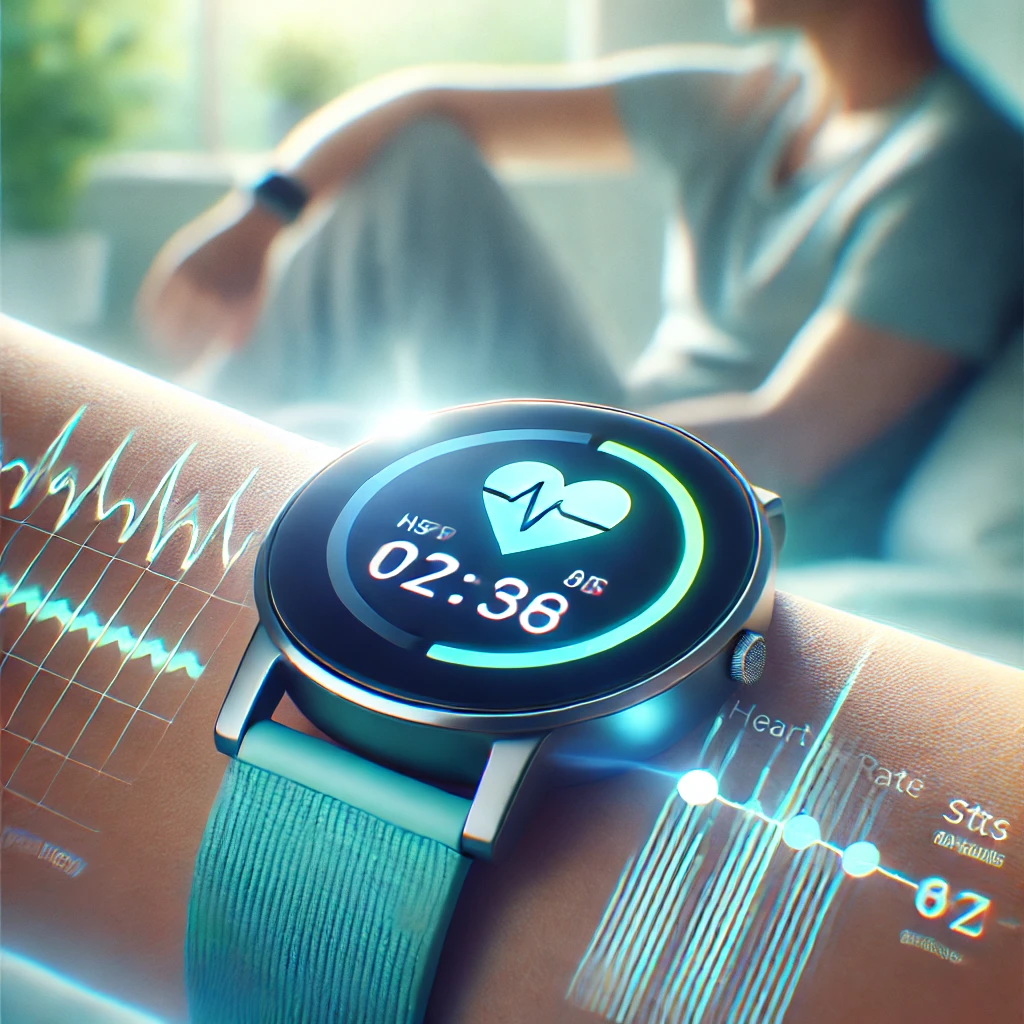
AI powered health monitoring is revolutionizing the way we manage our well-being. With the help of wearable devices and advanced AI technology, we can track our health in real-time, getting personalized insights that were once only available through healthcare professionals. Let’s dive into the key benefits of this technology.
1. Improved Accuracy
AI’s ability to process vast amounts of data quickly leads to more accurate health insights. Unlike traditional methods, AI can spot patterns and abnormalities that might go unnoticed by the human eye.
- Example: AI in diagnostic tools like EKG machines can detect heart issues far quicker than human doctors. It can identify irregular heartbeats and even predict future risks like heart attacks based on data from past events.
- Why it matters: Faster detection of health issues means quicker treatment and better outcomes.
2. Continuous Monitoring
One of the biggest advantages of AI-powered health monitoring is its ability to track health 24/7. With wearables and health apps, AI continuously monitors your vital signs and provides real-time updates.
- Example: The Apple Watch Series 6 continuously monitors blood oxygen levels and tracks ECG (electrocardiogram). This allows users to spot irregularities in their heart health before they become serious. It also tracks other metrics like heart rate, sleep, and even stress levels.
- Why it matters: Continuous monitoring gives users the ability to detect potential health problems early, allowing for timely intervention and reducing the risk of long-term health issues.
3. Proactive Health Management
AI does more than just track health data—it helps users take action. Based on your health data, AI offers personalized suggestions on diet, exercise, and even stress management to keep you on track with your wellness goals.
- Example: If your heart rate spikes during a stressful moment, AI can suggest stress-relieving activities, such as deep breathing or taking a break. It can also recommend lifestyle changes, like adjusting your diet or sleep habits to improve overall health.
- Why it matters: Proactive health management helps prevent serious health issues, such as heart disease or diabetes, by making daily adjustments based on real-time data.
Challenges and Limitations of AI in Health Monitoring
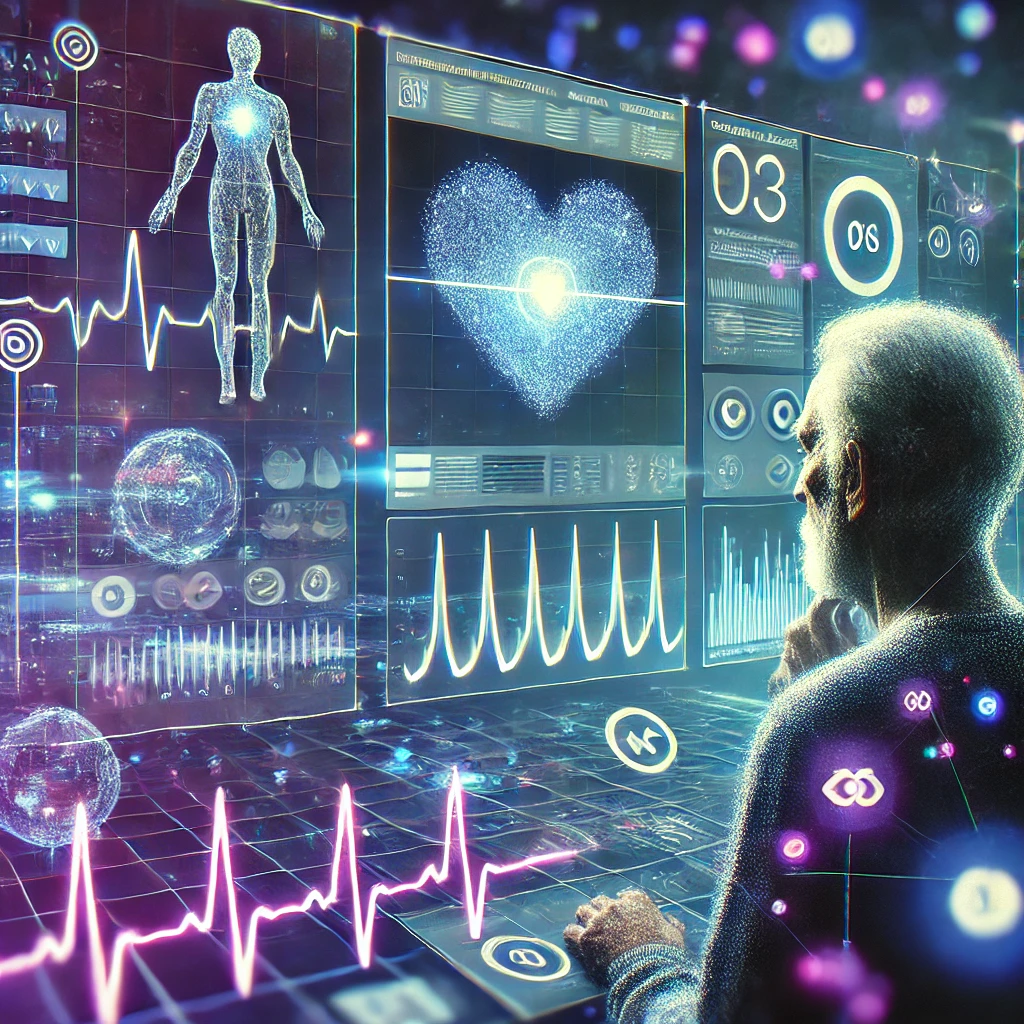
While AI-powered health monitoring offers many benefits, it also presents challenges. These issues need to be addressed to ensure that this technology continues to grow in a way that benefits everyone, while also maintaining trust and accessibility.
1. Data Privacy Concerns
Health data is highly sensitive, and as AI powered health monitoring systems collect more of it, privacy becomes a significant concern. Users must feel confident that their personal health information is safe.
- How Data is Used: AI systems collect information from wearables, health apps, and even genetic testing. This data is then processed and analyzed to provide personalized health recommendations.
- Example: The 2020 Fitbit data breach exposed user data, including health metrics like heart rate and sleep patterns, causing concerns about data security. This breach led to a wider conversation about how personal data is stored and shared.
- Why it matters: Data privacy is crucial because health information is not only personal but can also be used to identify individuals. Any breach can lead to identity theft or misuse of sensitive health data.
2. Reliability of AI Predictions
While AI can process massive amounts of data, it’s not always 100% accurate. AI predictions depend on the data fed into the system, and if the data is flawed or incomplete, the results can be misleading.
- Potential Misinterpretation of Data: AI algorithms are only as good as the data they are trained on. Sometimes, they may misinterpret or fail to identify crucial details.
- Example: Facial recognition AI has been shown to misinterpret certain health data. Studies have shown it may misdiagnose conditions, such as incorrectly identifying heart rate patterns or failing to recognize early signs of a stroke.
- Why it matters: Misdiagnoses can lead to incorrect treatment or missed health conditions, which can delay intervention and potentially put people’s health at risk.
3. Cost and Accessibility
AI-powered health monitoring devices and apps are not always affordable for everyone. While they offer great potential, high-end devices can be out of reach for many people.
- Cost of Devices: Many AI-powered health devices, such as WHOOP and Oura Ring, can cost hundreds of dollars, making them less accessible for individuals on a tight budget.
- Example: The WHOOP Strap tracks sleep, recovery, and physical activity, but it requires a monthly subscription to access the data. This ongoing cost can be prohibitive for some users.
- Why it matters: If only a portion of the population has access to these tools, it creates a gap in health management, making it harder for lower-income individuals to benefit from personalized health monitoring.
The Future of AI-Powered Health Monitoring in 2025 and Beyond
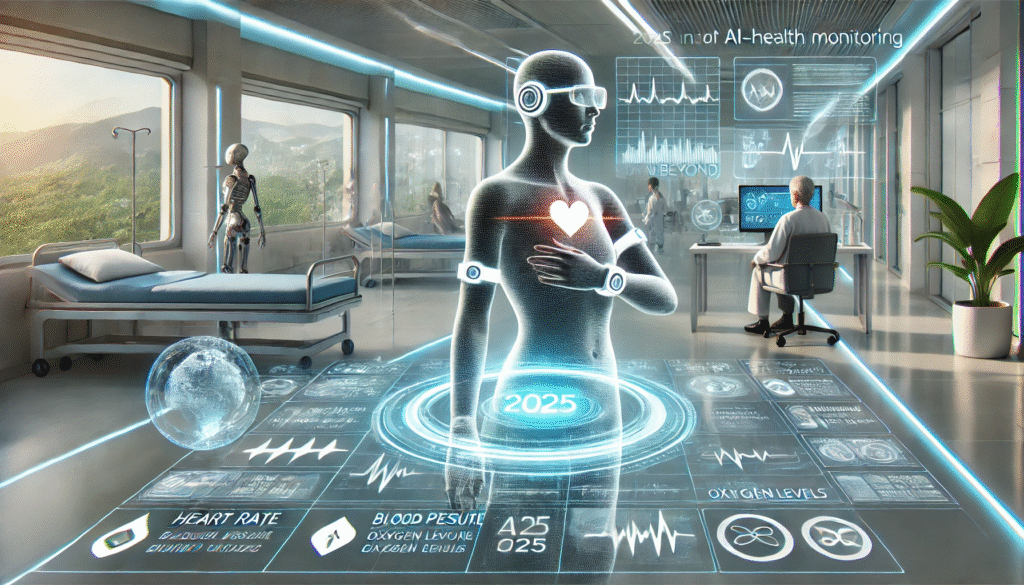
The future of AI-powered health monitoring in 2025 will bring revolutionary innovations that make tracking and improving our health more precise and personalized. We can expect:
More Accurate Algorithms:
AI algorithms will become smarter, processing more complex data with greater precision.
- Example: In the future, AI will track more biomarkers like blood glucose levels, hormone balance, and vitamin deficiencies, enabling more tailored recommendations for your health.
These advancements will help individuals manage chronic conditions, such as diabetes, and improve overall wellness.
Better Wearable Devices:
Wearable devices will evolve into more advanced tools that monitor a wider range of health metrics.
- Example: Devices will likely track heart rate variability, blood oxygen levels, stress levels, and sleep patterns all in one device. They will be even more accurate, using cutting-edge sensors to provide real-time data on your health.
Integrated Health Apps:
Apps powered by AI will become more integrated with other health technologies, offering a seamless experience.
- Example: Your fitness tracker might sync with your diet and sleep apps, making it easier to adjust your daily routine based on personalized health data.
Integration with Other Technologies
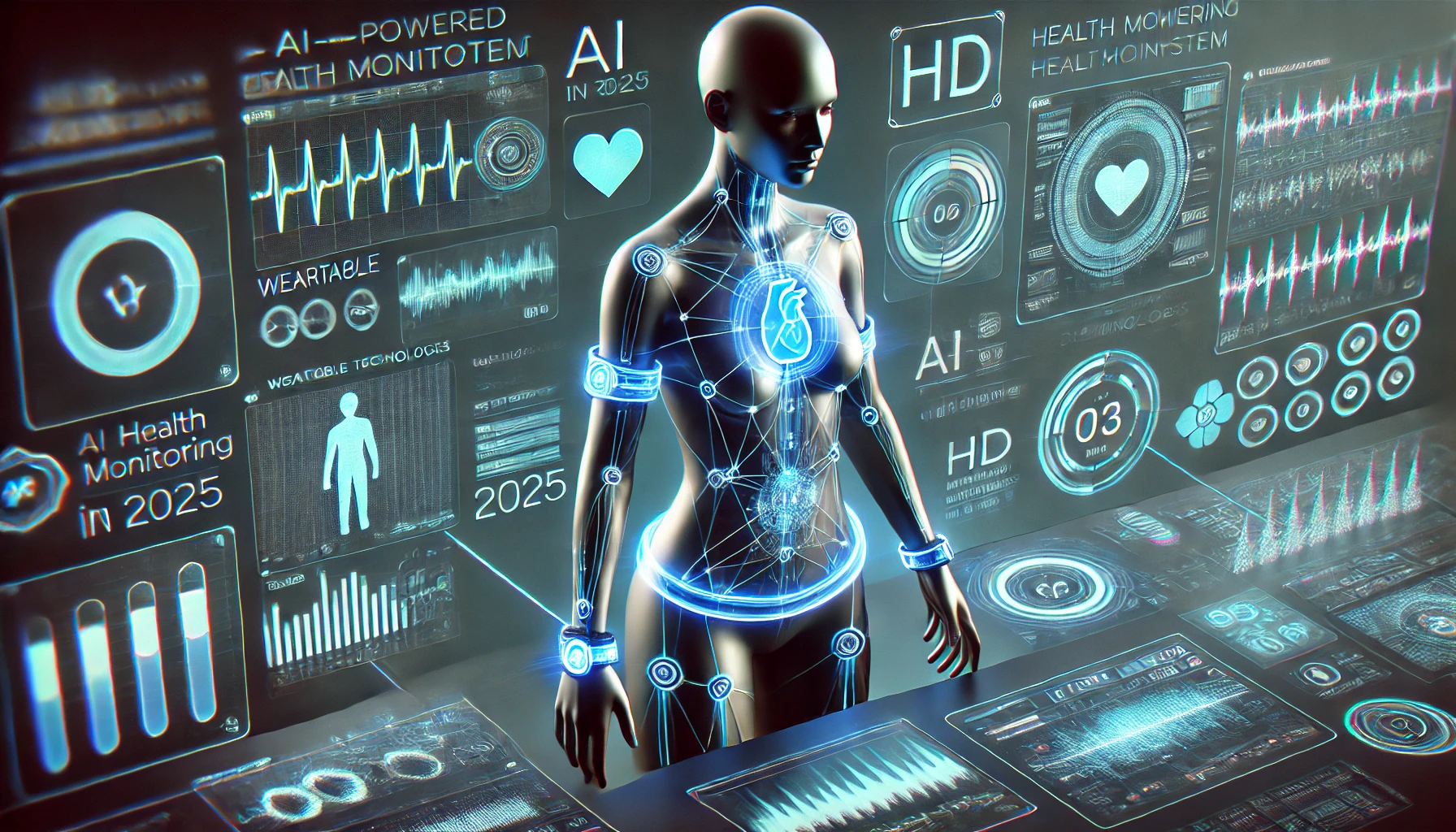
AI-powered health monitoring in 2025 will not only rely on standalone devices but will integrate with other technologies to enhance personalized wellness. Here’s what we can expect:
AI + Telemedicine:
AI will integrate with telemedicine platforms, offering real-time health advice and even consultations based on the data gathered by your wearable devices.
- Example: If your AI tracker detects irregular heart rhythms, a virtual health assistant can suggest a telemedicine consultation with a cardiologist, providing quick intervention if necessary.
AI + Genetic Testing:
The combination of AI and genetic testing will allow for even more tailored health advice.
- Example: Based on your genetic makeup, AI will be able to recommend specific diets, exercises, and supplements that are optimized for your body’s needs, reducing the trial-and-error approach in healthcare.
AI + Biotechnology:
AI will work with biotechnology to create solutions that address underlying causes of health conditions, rather than just symptoms.
- Example: Virtual health assistants could recommend AI-based treatments that use biotechnological advancements, like gene therapy, to prevent or reverse certain health conditions.
How to Incorporate AI Powered Health Monitoring Into Your Wellness Routine
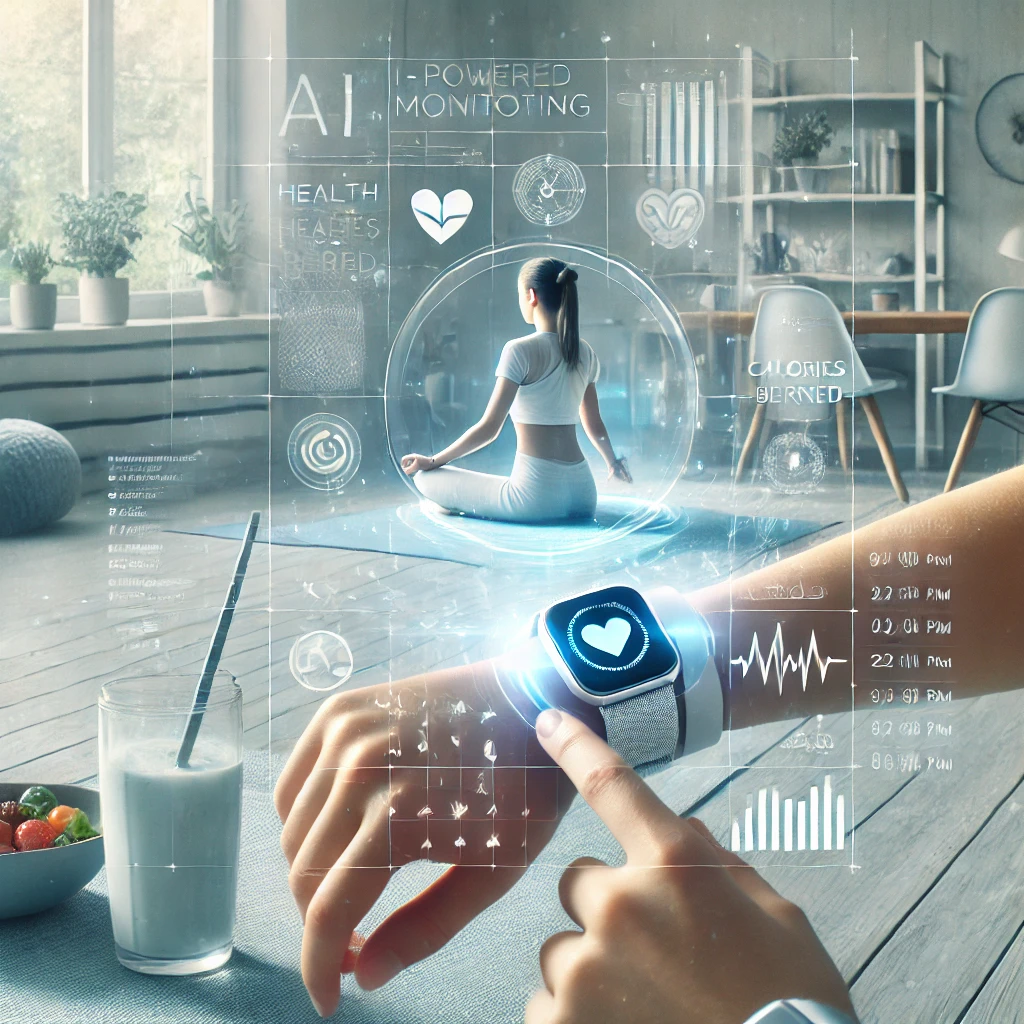
AI-powered health monitoring can be a game-changer in your wellness journey. With the right tools and strategies, you can use AI to enhance your health and make informed decisions. Here’s how you can get started and maximize the benefits of AI in your daily routine.
1. Choosing the Right Devices and Apps
Not all health monitoring devices are created equal. To get the most out of AI, choose wearables and apps that align with your specific health needs.
Wearables: Focus on devices that track vital signs you care about. For example, if you’re monitoring heart health, devices like the Apple Watch offer continuous heart rate tracking and can even detect arrhythmias.
- Apple Watch Series 6 monitors heart rate, ECG, and even blood oxygen levels in real-time.
Apps: Choose apps that sync with your wearables and provide insights on your data. WHOOP is excellent for tracking sleep, recovery, and workout intensity, making it ideal for athletes or fitness enthusiasts.
- WHOOP helps optimize your sleep, ensuring you get the most out of your recovery time.
2. Maximizing the Benefits of AI Health Monitoring
Once you have the right device or app, it’s time to use your AI health data to improve your lifestyle.
Adjust Your Workouts Based on Real-Time Data:
Use heart rate data, sleep analysis, and recovery insights to tailor your workouts.
- Example: If your AI device suggests that your recovery score is low, reduce the intensity of your next workout to avoid overtraining.
Manage Stress:
Many apps provide mindfulness and relaxation techniques based on your stress data.
- Example: Apps like Calm or Headspace can suggest meditation exercises when your AI device detects an increase in your stress levels. This helps manage daily stress, which is key to overall wellness.
Track Nutrition and Diet:
Sync apps like MyFitnessPal with your AI devices to optimize your nutrition intake based on activity levels and health goals.
3. User Experience
Real stories and feedback from users give you insights into how effective AI-powered health monitoring can be.
- Example: A Reddit user shared, “Using WHOOP helped me optimize my sleep and recovery, improving my performance the next day.” This shows how AI-driven devices can make a direct impact on your performance and well-being.
- Another Example: Fitbit users often share how their devices help them track everything from steps to heart rate, leading to healthier habits and better fitness tracking.
FAQs
1. How Accurate Are AI-Powered Wearables in Detecting Early Health Issues?
AI-powered wearables are increasingly capable of identifying early signs of health issues by analyzing real-time data from sensors.
- Example: The Eko Duo digital stethoscope, developed by doctors at Imperial College London, can detect major heart conditions such as heart failure and abnormal heart rhythms in just 15 seconds.
- Why It Matters: Early detection allows for timely intervention, potentially preventing serious health complications.
2. What Role Does AI Play in Personalized Wellness Plans?
AI is transforming wellness by creating personalized plans that adapt to individual health data.
- Example: Samsung’s Galaxy Watch integrates AI to monitor sleep patterns and provides tailored recommendations to improve sleep quality.
- Why It Matters: Personalized wellness plans enhance user engagement and effectiveness by aligning with individual health goals and lifestyles.
3. Can AI Health Coaches Replace Human Healthcare Providers?
While AI health coaches offer valuable support, they are designed to complement, not replace, human healthcare providers.
- Example: Google’s AI health coach in Pixel Watch 4 provides personalized fitness and wellness guidance, but users are encouraged to consult healthcare professionals for medical advice.
- Why It Matters: AI health coaches can assist with daily health management, but human expertise remains crucial for comprehensive medical care.
4. How Do AI-Powered Devices Integrate with Other Health Technologies?
AI-powered devices are increasingly integrating with other health technologies to provide a holistic view of an individual’s health.
- Example: Google’s AI health coach integrates with platforms like Health Connect and HealthKit to offer a comprehensive health experience.
- Why It Matters: Integration across platforms ensures seamless data flow, enhancing the accuracy and personalization of health recommendations.
5. What Are the Ethical Considerations of Using AI in Health Monitoring?
The use of AI in health monitoring raises ethical concerns regarding data privacy, consent, and algorithmic bias.
- Example: The development of AI health technologies involves ensuring compliance with regulations and ethical standards to protect user data.
- Why It Matters: Addressing ethical considerations is essential to maintain user trust and ensure the responsible use of AI in healthcare.


Leave a Comment